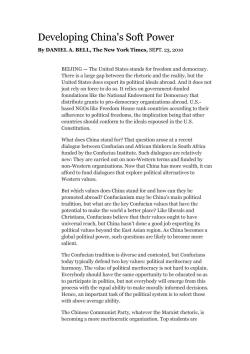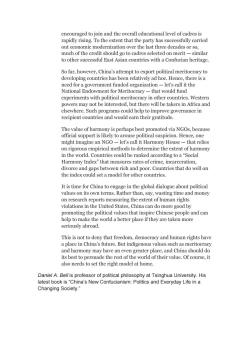《中国宪法学 Chinese Constitutional Law》课程教学资源(学术文献)Developing China's Soft Power

Developing China's Soft Power By DANIEL A.BELL,The New York Times,SEPT.23,2010 BEIJING-The United States stands for freedom and democracy. There is a large gap between the rhetoric and the reality,but the United States does export its political ideals abroad.And it does not just rely on force to do so.It relies on government-funded foundations like the National Endowment for Democracy that distribute grants to pro-democracy organizations abroad.U.S.- based NGOs like Freedom House rank countries according to their adherence to political freedoms,the implication being that other countries should conform to the ideals espoused in the U.S. Constitution. What does China stand for?That question arose at a recent dialogue between Confucian and African thinkers in South Africa funded by the Confucius Institute.Such dialogues are relatively new:They are carried out on non-Western terms and funded by non-Western organizations.Now that China has more wealth,it can afford to fund dialogues that explore political alternatives to Western values. But which values does China stand for and how can they be promoted abroad?Confucianism may be China's main political tradition,but what are the key Confucian values that have the potential to make the world a better place?Like liberals and Christians,Confucians believe that their values ought to have universal reach,but China hasn't done a good job exporting its political values beyond the East Asian region.As China becomes a global political power,such questions are likely to become more salient. The Confucian tradition is diverse and contested,but Confucians today typically defend two key values:political meritocracy and harmony.The value of political meritocracy is not hard to explain. Everybody should have the same opportunity to be educated so as to participate in politics,but not everybody will emerge from this process with the equal ability to make morally informed decisions. Hence,an important task of the political system is to select those with above average ability. The Chinese Communist Party,whatever the Marxist rhetoric,is becoming a more meritocratic organization.Top students are
Developing China's Soft Power By DANIEL A. BELL, The New York Times, SEPT. 23, 2010 BEIJING — The United States stands for freedom and democracy. There is a large gap between the rhetoric and the reality, but the United States does export its political ideals abroad. And it does not just rely on force to do so. It relies on government-funded foundations like the National Endowment for Democracy that distribute grants to pro-democracy organizations abroad. U.S.- based NGOs like Freedom House rank countries according to their adherence to political freedoms, the implication being that other countries should conform to the ideals espoused in the U.S. Constitution. What does China stand for? That question arose at a recent dialogue between Confucian and African thinkers in South Africa funded by the Confucius Institute. Such dialogues are relatively new: They are carried out on non-Western terms and funded by non-Western organizations. Now that China has more wealth, it can afford to fund dialogues that explore political alternatives to Western values. But which values does China stand for and how can they be promoted abroad? Confucianism may be China’s main political tradition, but what are the key Confucian values that have the potential to make the world a better place? Like liberals and Christians, Confucians believe that their values ought to have universal reach, but China hasn’t done a good job exporting its political values beyond the East Asian region. As China becomes a global political power, such questions are likely to become more salient. The Confucian tradition is diverse and contested, but Confucians today typically defend two key values: political meritocracy and harmony. The value of political meritocracy is not hard to explain. Everybody should have the same opportunity to be educated so as to participate in politics, but not everybody will emerge from this process with the equal ability to make morally informed decisions. Hence, an important task of the political system is to select those with above average ability. The Chinese Communist Party, whatever the Marxist rhetoric, is becoming a more meritocratic organization. Top students are

encouraged to join and the overall educational level of cadres is rapidly rising.To the extent that the party has successfully carried out economic modernization over the last three decades or so, much of the credit should go to cadres selected on merit-similar to other successful East Asian countries with a Confucian heritage. So far,however,China's attempt to export political meritocracy to developing countries has been relatively ad hoc.Hence,there is a need for a government funded organization-let's call it the National Endowment for Meritocracy-that would fund experiments with political meritocracy in other countries.Western powers may not be interested,but there will be takers in Africa and elsewhere.Such programs could help to improve governance in recipient countries and would earn their gratitude. The value of harmony is perhaps best promoted via NGOs,because official support is likely to arouse political suspicion.Hence,one might imagine an NGO-let's call it Harmony House-that relies on rigorous empirical methods to determine the extent of harmony in the world.Countries could be ranked according to a"Social Harmony Index"that measures rates of crime,incarceration, divorce and gaps between rich and poor.Countries that do well on the index could set a model for other countries. It is time for China to engage in the global dialogue about political values on its own terms.Rather than,say,wasting time and money on research reports measuring the extent of human rights violations in the United States,China can do more good by promoting the political values that inspire Chinese people and can help to make the world a better place if they are taken more seriously abroad. This is not to deny that freedom,democracy and human rights have a place in China's future.But indigenous values such as meritocracy and harmony may have an even greater place,and China should do its best to persuade the rest of the world of their value.Of course,it also needs to set the right model at home. Danie/A.Bell is professor of political philosophy at Tsinghua University.His latest book is"China's New Confucianism:Politics and Everyday Life in a Changing Society
encouraged to join and the overall educational level of cadres is rapidly rising. To the extent that the party has successfully carried out economic modernization over the last three decades or so, much of the credit should go to cadres selected on merit — similar to other successful East Asian countries with a Confucian heritage. So far, however, China’s attempt to export political meritocracy to developing countries has been relatively ad hoc. Hence, there is a need for a government funded organization — let’s call it the National Endowment for Meritocracy — that would fund experiments with political meritocracy in other countries. Western powers may not be interested, but there will be takers in Africa and elsewhere. Such programs could help to improve governance in recipient countries and would earn their gratitude. The value of harmony is perhaps best promoted via NGOs, because official support is likely to arouse political suspicion. Hence, one might imagine an NGO — let’s call it Harmony House — that relies on rigorous empirical methods to determine the extent of harmony in the world. Countries could be ranked according to a “Social Harmony Index” that measures rates of crime, incarceration, divorce and gaps between rich and poor. Countries that do well on the index could set a model for other countries. It is time for China to engage in the global dialogue about political values on its own terms. Rather than, say, wasting time and money on research reports measuring the extent of human rights violations in the United States, China can do more good by promoting the political values that inspire Chinese people and can help to make the world a better place if they are taken more seriously abroad. This is not to deny that freedom, democracy and human rights have a place in China’s future. But indigenous values such as meritocracy and harmony may have an even greater place, and China should do its best to persuade the rest of the world of their value. Of course, it also needs to set the right model at home. Daniel A. Bell is professor of political philosophy at Tsinghua University. His latest book is “China’s New Confucianism: Politics and Everyday Life in a Changing Society
按次数下载不扣除下载券;
注册用户24小时内重复下载只扣除一次;
顺序:VIP每日次数-->可用次数-->下载券;
- 《中国宪法学 Chinese Constitutional Law》课程教学资源(学术文献)Update on China’s Open Government Information Regulations:Surprising Public Demand Yielding Some Positive Results.pdf
- 《中国宪法学 Chinese Constitutional Law》课程教学资源(学术文献)Regulations of the People’s Republic of China on Open Government Information.pdf
- 《中国宪法学 Chinese Constitutional Law》课程教学资源(学术文献)Toward a More Open China?.pdf
- 《中国宪法学 Chinese Constitutional Law》课程教学资源(学术文献)China's Criminal Justice System:A Work in Progress.pdf
- 《中国宪法学 Chinese Constitutional Law》课程教学资源(学术文献)China's Changing Constitution.pdf
- 《中国宪法学 Chinese Constitutional Law》课程教学资源(学术文献)BASIC CONCEPTS OF CHINESE LAW:THE GENESIS AND EVOLUTION OF LEGAL THOUGHT IN TRADITIONAL CHINA.pdf
- 《中国宪法学 Chinese Constitutional Law》课程教学资源(学术文献)adjudication supervision and judicial independence in china.pdf
- 《中国宪法学 Chinese Constitutional Law》课程教学资源(学术文献)HARVARD LAW REVIEW(SEPARATION OF PARTIES, NOT POWERS).pdf
- 《生活中的民法》课程教学资源(教学案例)第6讲 高空抛物案例-民事判决书.doc
- 《生活中的民法》课程教学资源(教学案例)第6讲 重庆市第四中级人民法院——黔江民族医院案件.docx
- 《生活中的民法》课程教学资源(教学案例)第6讲 肯德基烫伤案——杭州肯德基有限公司、杭州肯德基有限公司绍兴华谊分店与谢文萍人身损害赔偿纠纷上诉案.doc
- 《生活中的民法》课程教学资源(教学案例)第6讲 田某诉王某某一般人格权纠纷案.doc
- 《生活中的民法》课程教学资源(教学案例)第6讲 王保富案.pdf
- 《生活中的民法》课程教学资源(教学案例)第6讲 民法基本原则案例分析(曹桂华等诉闾志华损害赔偿案)——温祯.docx
- 《生活中的民法》课程教学资源(教学案例)第6讲 张开芬诉张开芬姓名权纠纷案.doc
- 《生活中的民法》课程教学资源(教学案例)第6讲 庄保成与许仁梅、白崇朝、卧龙区鑫龙烟花爆竹有限公司健康权纠纷案.doc
- 《生活中的民法》课程教学资源(教学案例)第6讲 周宇等与花垣县水电站等触电人身损害赔偿纠纷案.docx
- 《生活中的民法》课程教学资源(教学案例)第6讲 医院错交孩子案.doc
- 《生活中的民法》课程教学资源(教学案例)第5讲 顾锡炎诉哈哈餐饮美食有限公司未经同意使用其房产要求迁让案.doc
- 《生活中的民法》课程教学资源(教学案例)第5讲 杨某某与欧阳某某等房屋买卖合同纠纷案.doc
- 《中国宪法学 Chinese Constitutional Law》课程教学资源(学术文献)DEALING WITH DISCRIMINATION IN MAINLAND CHINA(AN OVERVIEW OF DISCRIMINATION IN EMPLOYMENT AND THE LEGAL FRAMEWORK ADDRESSING IT).pdf
- 《中国宪法学 Chinese Constitutional Law》课程教学资源(学术文献)Drafting Legislation for Development:Lessons from a Chinese Project.pdf
- 《中国宪法学 Chinese Constitutional Law》课程教学资源(学术文献)“Courageous Explorers”?:Education Litigation and Judicial Innovation in China.pdf
- 《中国宪法学 Chinese Constitutional Law》课程教学资源(学术文献)LEGISLATIVE REVIEW OVER COURT DECISIONS.pdf
- 《中国宪法学 Chinese Constitutional Law》课程教学资源(学术文献)Opening to Reform?(An Analysis of China's Revised Criminal Procedure Law).pdf
- 《中国宪法学 Chinese Constitutional Law》课程教学资源(学术文献)Constitutionalism with Chinese Characteristics?:Constitutional Development and Civil Litigation in China.pdf
- 《中国宪法学 Chinese Constitutional Law》课程教学资源(学术文献)HARVARD LAW REVIEW(Seperation of Parties, Not Powers).pdf
- 《中国宪法学 Chinese Constitutional Law》课程教学资源(学术文献)The United States of China.pdf
- 《中国宪法学 Chinese Constitutional Law》课程教学资源(学术文献)To Understand China, Look Behind Its Laws.pdf
- 《中国宪法学 Chinese Constitutional Law》课程教学资源(学术文献)The Developing Rule of Law in China.pdf
- 《中国宪法学 Chinese Constitutional Law》课程教学资源(学术文献)Judicial Reform in China and Its Political Implications.pdf
- 《中国宪法学 Chinese Constitutional Law》课程教学资源(学术文献)What Does China Mean by Rule of Law.pdf
- 《中国宪法学 Chinese Constitutional Law》课程教学资源(学术文献)Constitutional Review in China:An Unaccomplished Project or a Mirage?.pdf
- 《中国宪法学 Chinese Constitutional Law》课程教学资源(宪法条文)CONSTITUTION OF THE PEOPLE'S REPUBLIC OF CHINA(Adopted on December 4, 1982).doc
- 《中国宪法学 Chinese Constitutional Law》课程教学资源(学术文献)China's Marbury:Qi Yuling v. Chen Xiaoqi - The Once and Future Trial of Both Education & Constitutionalization.pdf
- 上海交通大学:《法理学》课程教学资源(PPT课件)司法.pptx
- 上海交通大学:《法理学》课程教学资源(PPT课件)法与人权.pptx
- 上海交通大学:《法理学》课程教学资源(PPT课件)法与政治的关系.pptx
- 上海交通大学:《法理学》课程教学资源(PPT课件)法与文化.pptx
- 上海交通大学:《法理学》课程教学资源(PPT课件)法与正义.pptx
